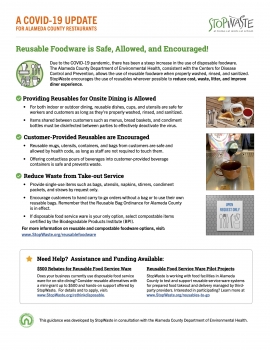Monthly Topic Briefs
Updates on current issues and projects.

Each year, StopWaste awards local nonprofit and businesses grant funding for projects focused on repair, reuse, food waste prevention, and food donation equipment. The program engages businesses and community-based organizations to reduce waste in Alameda County while helping to address some of the County’s most pressing environmental and equity issues.

Medicine and prescription drugs play a critical role in our lives, but unfortunately, many consumers are unfamiliar with the proper way to discard leftover or old prescriptions. Medications and prescription drugs should not be put in the trash, recycling, or compost bin, nor flushed or poured down the drain.
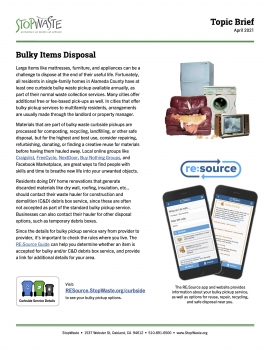
Large items like mattresses, furniture, and appliances can be a challenge to dispose at the end of their useful life. Fortunately, all residents in single-family homes in Alameda County have at least one curbside bulky waste pickup available annually, as part of their normal waste collection services.
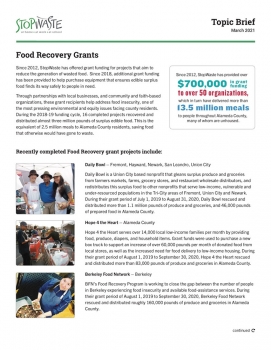
Since 2012, StopWaste has offered grant funding for projects that aim to reduce the generation of wasted food. Since 2018, additional grant funding has been provided to help purchase equipment that ensures edible surplus food finds its way safely to people in need.
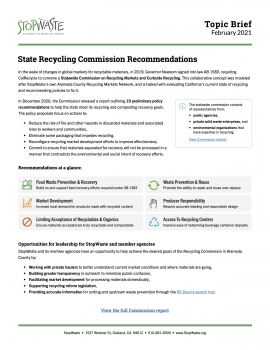
In the wake of changes in global markets for recyclable materials, in 2019, Governor Newsom signed into law AB 1583, requiring CalRecycle to convene a Statewide Commission on Recycling Markets and Curbside Recycling.
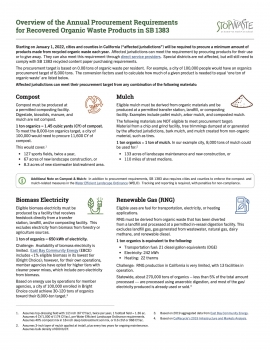
Starting on January 1, 2022, cities and counties in California will be required to procure a minimum amount of products made from recycled organic waste each year. Affected jurisdictions can meet the requirement by procuring products for their use or to give away.

As part of its annual Business Efficiency Awards, StopWaste is recognizing four Alameda County businesses for their efforts in upstream waste prevention through reuse, recycling, composting, and food waste prevention. Their leadership this year is particularly exemplary given the operational challenges they faced during the COVID-19 pandemic.
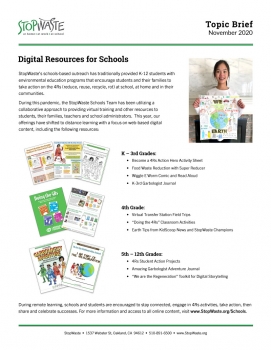
StopWaste’s schools-based outreach has traditionally provided K-12 students with environmental education programs that encourage students and their families to take action on the 4Rs (reduce, reuse, recycle, rot) at school, at home and in their communities.
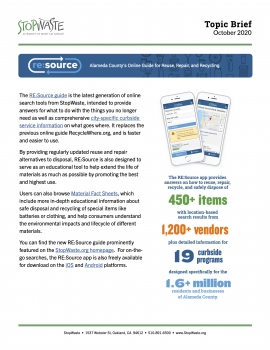
The RE:Source guide is the latest generation of online search tools from StopWaste, intended to provide answers for what to do with the things you no longer need as well as comprehensive city-specific curbside service information on what goes where. It replaces the previous online guide RecycleWhere.org, and is faster and easier to use.
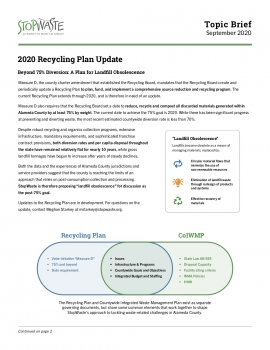
Measure D, the county charter amendment that established the Recycling Board, mandates that the Recycling Board create and periodically update a Recycling Plan to plan, fund, and implement a comprehensive source reduction and recycling program. The current Recycling Plan extends through 2020, and is therefore in need of an update.

In 2018, StopWaste partnered with Alameda County school districts and food recovery organizations to pilot a new food donation program through the Smart Cafeteria Initiative. This program, funded in part by a grant from CalRecycle, was designed to help schools reduce waste through prevention, food share, re-serving, and donation to those in need.
